‘Santa Has a Budget’: This Christmas, Teach Your Kids To Live In the Real World

The holidays are a time of celebration, family time and gift-giving -- and the latter can sometimes overshadow the other aspects of the season. And as parents tally up the items on their children's wish lists, they might also discover important lessons along the way to teach their kids about money.
See Our List: 100 Most Influential Money Experts
Read More: If Your Credit Score Is Under 740, Make These 4 Moves Now
"The holiday season offers plenty of opportunities to teach kids important financial lessons, such as saving and budgeting, as well as the value of a dollar," said Emily Shallal, senior director of customer strategy and innovation at Ally Financial. "And the gift of financial literacy? Priceless."
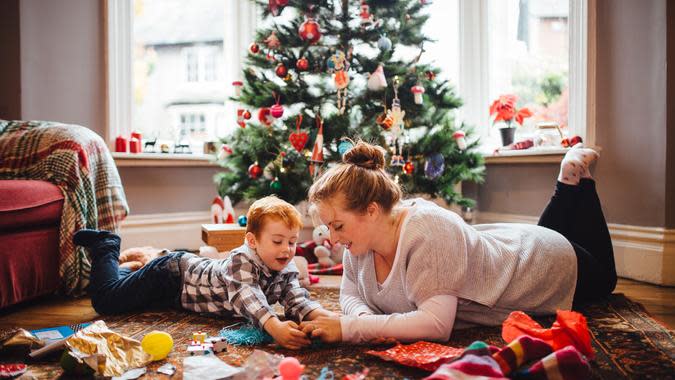
Santa Has a Budget
Shannon McLay, the host of the podcast "Martinis and Your Money," said on her show that she used to go overboard with gifts. Now, she uses Christmas as an opportunity to teach her son, Will, about budgeting.
"I went the path of creating this crazy Christmas reality, and then when I started working on getting more financially healthy, we then started to change the conversation with Will," she said. "We were like, 'OK, you have a Christmas list, and it's only five things on the list. That's all Santa can carry on his sleigh.' Then it became, 'Your list has a budget because Santa has a budget.'"
"The older he got, he would look things up, and we'd be like, 'OK, this is Santa's budget. Find the things that fit in the budget,'" she said. "Why wouldn't Santa have a budget? Everyone else has a budget!"
Take Our Poll: Are You Struggling To Keep Up With Your Utility Bills?

Every Family Has Different Financial Priorities and Values
If your kids compare their Christmas gifts and traditions with that of their peers, you can teach them that every household is different, and not everyone approaches giving and spending the same way.
"Kids expect what you create for them," Liz Thames of Frugalwoods.com said on the "Martinis and Your Money" podcast. "We use the line a lot, 'This is what we do in our family.' Things are done differently in different people's houses, and it's fine. You, as the parent, are in charge. You get to decide what traditions you carry forward and which ones you don't. Yes, there's peer pressure, but you're in charge of creating that home base and those home core values."
"The way that you want to handle holidays is what flies," she continued. "We are decorated to the max, there is music, I am baking cookies, but we don't have a ton of gifts. It's just not the focus for us."
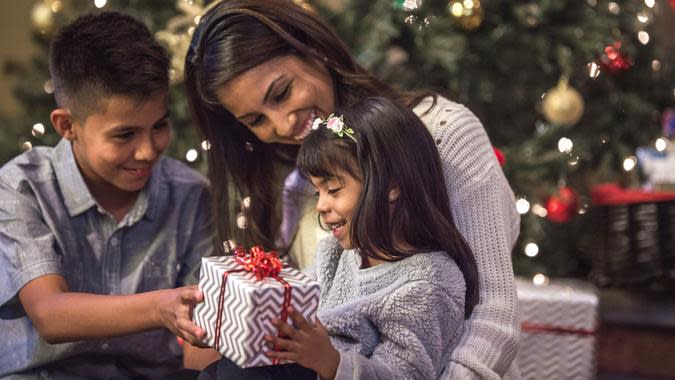
Gift-Giving Has Its Limits
McLay buys her son gifts in four separate categories and sets budgets for each.
"Now we follow the [gift categories], 'something you want,' 'something you need,' 'something to wear' and 'something to read,'" she said on the podcast. "The 'something he wants' is his one big gift -- it has a budget of $200. 'Something he needs' is usually shampoo, toothbrush, toothpaste, deodorant. 'Something to wear' could be a sweater. 'Something to read' is the books we buy him. We've been doing that the last few years."

This Is What It's Like in the Real World
Getting your kids everything they want can set a bad precedent and give them unrealistic expectations about money.
"Even if you can afford everything, don't get it for them," Thames said on the podcast. "There's so much that goes into building grit and tolerance for discomfort that I think is important. Not fulfilling their every desire is hard as parents, but I think it sets them up for what life is like."
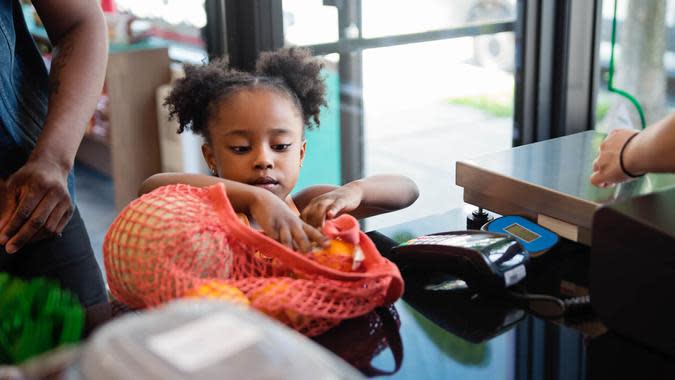
It's Important To Give Back
Stacy Allred, senior managing director of First Republic Investment Management, suggests an activity that combines budgeting and the concept of paying it forward.
"A lot of food pantries will have a wish list of items on their website," Allred said. "One easy but powerful activity is to print out the list, and give the kids cash in an envelope with a budget for how much they have to spend to buy those items."
Take the kids to the grocery store with the list, budget and calculator. Let them shop, pay for the food and deliver it to the food pantry. This can help kids learn about shopping on a budget while they help other people. Allred suggested setting a budget between $20 and $100 per kid for this activity.
"It's the act that's more important than the amount," she said.

Inflation Changes Things
Allred suggested tracking the cost of items every year to see how prices increase over time. Doing this can help illustrate for kids the value of a dollar and how the economy can have an impact on it.
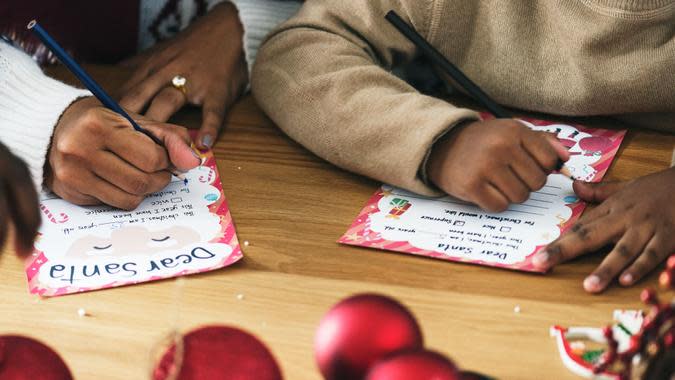
It's Better To Give Than To Receive
Christmas is a great time to teach your kids the lesson that it's better to give than to receive. And teaching thoughtful gift-giving can help kids think from the recipient's perspective, Allred said.
"In order to help kids learn the act of giving, don't just hop in the car and run [to] the mall," she said. "It's starting by coming up with a list of ideas, thinking of what that person might like, doing some research, [then] going to the store, making decisions and wrapping the gifts so that they're learning that aspect of it."

Set Limits and Find the Best Prices When Shopping
In addition to setting a budget for the gifts your child receives, set a budget for the gifts your child gives, said John Durrant, president at Banking Solutions.
Durrant suggested coming up with a list of all the people your child wants to buy gifts for and set a spending limit for each. Then, teach them the importance of being a smart shopper by guiding them to look for items that are on sale.
"Encourage them to shop around for the best price so they get the most bang for their buck," he said.
Help them track their spending to make sure they are staying within the set budgets.

Experiences Can Be More Meaningful Than Physical Things
Allred has worked with parents who ask their kids to learn a new skill and show it to them on Christmas rather than having them buy gifts.
"It's everything from learning how to play the saxophone and performing a song, to learning video software and making a video," she said. This teaches kids about the value of experiences to show there are many ways to give a gift to someone, she added.

Just Because You Can Doesn't Mean You Should
It's important to teach your kids that just because you can afford to buy them a big-ticket item doesn't mean it's a good financial decision, Allred said.
"[One family] has the saying, 'Just because we can doesn't mean we should,'" she said. "They're very explicit on setting boundaries and not caving in to the kids when they pull the 'all my friends have it' card. They talk very explicitly about their values about saving, spending and sharing of money, and setting those boundaries."

Understand Opportunity Cost
Opportunity cost -- the idea that there is a loss and gain when choosing one opportunity over another -- is a lesson that's more inherent when means are limited.
"If I grow up in a family of limited means, I learn opportunity costs very naturally," Allred said. "'Do we buy a new TV this summer or do we go on a family vacation?'"
However, families who have a higher budget during the holidays can still use this time to teach the idea of opportunity cost, she said.
"If your family is going on an outing during the holiday and you have different activities planned, one idea is to bring the kids in and [give them] a budget for the activities," she said. "Help them do their research and let them make the decision. If you're going to Mexico, do you do surfing lessons? If you are doing the surfing lesson, perhaps you are not also going deep-sea fishing."

Invest In Your Future
If you have older kids, you might tie their interests into a lesson about investing. You can even read them books on investing for kids to pair with that lesson.
"One family was buying their teenage boys gaming equipment, and also then paired that with having a discussion with their Merrill private wealth advisor about the e-gaming industry," Allred said. "If you're buying something that the kid is interested in, pair it with the thematic research and start to teach them about investing. You could also pair that with a small investment in an account that they're active with you on."
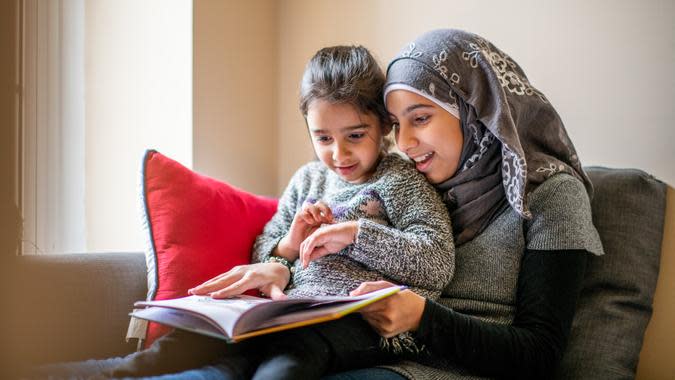
What Can You Learn From 'The Giving Tree'?
Another way to infuse financial lessons into your holidays is to give young children books that teach financial lessons, such as "The Giving Tree," Allred said. Think of questions to ask your child while you read, and use reading the book as an opportunity to discuss financial topics.

You Have To Earn To Spend
The holidays are a great time to teach kids about the true value of a dollar. Encourage them to earn their own money to spend on gifts.
"It could be tempting to simply give your tween a monthly or weekly allowance, but encouraging them to earn their money will make a long-lasting impact on how they manage their finances," Durrant said. "Your child may not be old enough to get a job, but they can earn their holiday spending money through chores or by starting their own business such as a lemonade stand or babysitting."

It's Important To Save
If your child doesn't already have a savings account, consider opening one for them as a holiday gift.
"Savings goals are a necessary component of any good financial plan," Durrant said. "Encourage your kids to start saving at the beginning of the year, allotting various buckets for different savings goals such as a holiday shopping fund. Beginning these conversations about financial literacy early on helps to set the foundation for success for your kids."

You Can Contribute, Too
If you get a head start on teaching your child the importance of saving, consider having them save a set amount of their allowance for what they want for Christmas. This teaches them to be an active financial contributor to their wants rather than being dependent on mom and dad to cover all expenses.
"One of the best ways for kids to learn is to have their own money and use it to buy things," Ally Financial's Shallal said. "It reinforces that this was their decision and makes it real, versus using someone else's money."
"For larger purchases, consider having them join you in saving money for them," said Ben Watson, CPA and vCFO of DollarSprout.com. "If they want an expensive toy or experience such as summer camp, have them save up to cover 10% to 50% of the cost while you cover the rest."

Don't Take On Debt You Can't Pay Back
If you have older kids, you might consider lending them money to spend on gifts for others rather than giving it to them outright. Then come up with a plan for how they can pay you back. This can be through doing extra chores or getting a job if they are old enough.
The concept of debt can be a tricky one to teach, but it's an important one. And the holidays can be the perfect time to teach your kids about it.

There's a Difference Between 'Needs' and 'Wants'
Your child might state that they "need" to get a certain toy or pair of shoes under the tree this year. This statement can open the door for a frank financial discussion.
"If your kids are asking for a lot of items this holiday season, have a candid conversation with them," said Leslie Tayne, founder and head attorney at debt solutions law firm Tayne Law Group. "Discuss the difference between needs and wants."

Take Time To Reflect
Teaching kids about finances is an ongoing process. To help them learn, be there to guide them.
"Watch the way that your kids make decisions around earning, saving and spending during the holidays," Allred said. "Take time to reflect and make those lessons visible. I think, oftentimes with decision-making, we don't take the time to really intentionally reflect on that experience." Doing so can reveal other lessons, she said.
More From GOBankingRates
This article originally appeared on GOBankingRates.com: ‘Santa Has a Budget’: This Christmas, Teach Your Kids To Live In the Real World

 generic
generic 